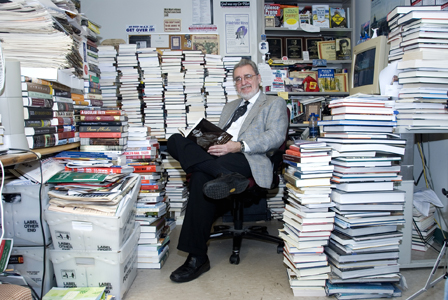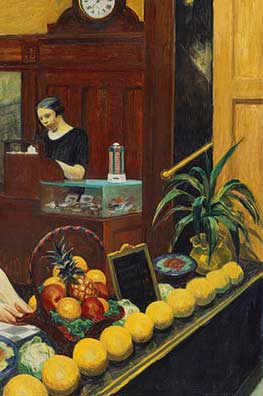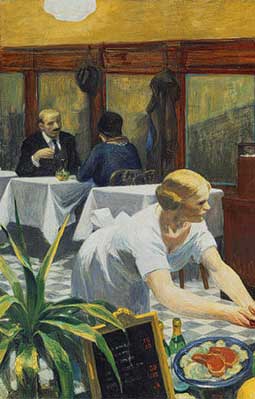Dave Itzkoff has been an embarrassment to the New York Times Book Review for some time, imbuing his “Across the Universe” columns with a know-nothing hubris that one expects from an investment banker who considers himself an art expert simply because he’s had his secretary send in a tax-deductible donation to the opera. Never mind that he hasn’t once listened to Verdi. But Itzkoff’s latest piece truly demonstrates that the wretched and rackety well has no bottom limit. Reading Itzkoff is like being paired up with some otiose oaf on a field assignment who will cluelessly drill into a septic tank and spew all manner of malodorous shit without recognizing how incompetent and disgusting this is. Unlike someone like quarterback Eli Manning, Itzkoff’s instincts can’t help him win the game. Not even accidentally.
Itzkoff first tries to be cutesy with this column, comparing his subway rides to “Bruce Campbell dodging zombies,” when in fact the Evil Dead films concerned themselves with the backwoods, not an urban setting, and it was the supernatural (as opposed to zombies) that Bruce Campbell dodged in the Evil Dead films. He might have had a decent comparison on his hands had he evoked something along the lines of Lamberto Bava’s Demons. But a tired and clumsy reference to Bruce Campbell? Clearly, this was one of those “hip” comparisons that Itzkoff sneaked into his column not with the intent of relating to his audience, but to desperately pine for a geek chic he clearly does not and can never possess.
And then we have the telltale phrase of a dolt signifying everything: “I sometimes wonder how any self-respecting author of speculative fiction can find fulfillment in writing novels for young readers.” I wonder how any “critic” could write such a clueless sentence. Bad enough that Itzkoff invokes two books that have been out for many months (one more than a year) and is about as current on science fiction as a high school jock trying to crib tips from reluctant geeks who recognize a flagrant pettifogger. But this ignoramus also has the temerity to suggest that speculative fiction authors can only write speculative fiction and that there is nothing of value in YA books. Further, Itzkoff can’t seem to understand that selling millions of books may not be why an author turns to the form. As it so happens, China Miéville was once good enough to tell me that he didn’t write Un Lun Dun with money in mind. But he didn’t need to inform me about the artistic satisfaction he found in creating worlds for kids. It was, despite my quibbles with the book, nascent on the page. You’d have to be a tone-deaf dilettante out of your element not to see it.
Then there is Itzkoff’s ignorance in quoting Miéville’s previous works. He doesn’t cite the New Crobuzon books (were they just too long and too filled with big words for Itzkoff to ken?). He seems to think that a fantasy audience is more likely to know Miéville for King Rat and his short stories. When in fact, the reverse is true. And what should Miéville’s polemic on Tolkien have to do with the imaginative strengths of Un Lun Dun? Is Itzkoff taking the piss out of Miéville’s socialist views by comparing this essay to “one of the most imaginative young adult novels of the post-Potter era?” When, in fact, Miéville argued:
As socialists, we don’t judge art by the politics of its creator – Trotsky loved Celine, Marx loved Balzac, and neither author was exactly a lefty. However, when the intersection of politics and aesthetics actually stunts the art, it’s no red herring to play the politics card.
Un Lun Dun is not a case where the environmental politics stunt the art. And if this is Itzkoff’s crass attempt to be clever, to equate Miéville’s politics with his art, then why doesn’t he just fess up to what a pinko author Miéville is?
And then there is this bafflingly obvious observation:
When Miéville hangs a crucial story element on an alternate definition of the word “phlegm,” he does so not only to educate his audience about its forgotten second meaning, but also to acknowledge that kids love the word “phlegm.”
You think, Itzkoff? That’s a bit like writing, “When Miéville titled his book Un Lun Dun, he does so not only to suggest phonetic transcription, but also to acknowledge that kids love to misspell words.” It’s the kind of dull conclusion I’d expect from a burned out undergraduate taking on some hack assignment of dumbing down literature for a Cliffs Notes volume. Not something from the New York Times.
When Itzkoff brings up Neil Gaiman and Michael Reaves’s InterWorld, the book is “still something of a departure,” presumably because Itzkoff remains incapable of fathoming why a fantasy author would be found in the children’s section. Bafflingly, Itzkoff writes that the book “falls into the same broad category as ‘Un Lun Dun.'” While you’re at it, Itzkoff, why don’t you tell us that the book is “published by the good people at McGraw Hill?” These are utterly useless sentences. Itzkoff can’t seem to accept a book as a book. He feels the need to pigeonhole it, even to suggest that Gaiman and Reaves had a specific type of reader in mind, when, in fact, the book’s origins have a completely different story. But Itzkoff is too lazy to conduct even the most basic of research. Again, he would rather assume and drop in a reference to Heavy Metal.
Itzkoff writes that InterWorld “isn’t sugarcoated for its readership” and describes how it “wastes no time in putting its young heroes in mortal peril.” Which leads one to wonder whether Itzkoff is even familiar with this little story called “Jack and the Beanstalk,” which featured this giant chanting for the blood of an Englishman. As nearly every bedtime reader knows, children’s stories have a long history of putting young heroes in mortal peril. See, for instance, the tales of Grimm.
Why someone like Itzkoff has remained continually employed at the NYTBR for nearly two years is no mystery. Nobody at the NYTBR gives a good goddam about science fiction, nor do they care about incisive coverage of genre books. I doubt very highly that Sam Tanenhaus or Dwight Garner have read one science fiction book in their entire NYTBR tenure. There’s certainly no evidence to suggest that either of these two have open minds on the subject. Garner once described Philip K. Dick as a “trippy science-fiction writer.” Which is a bit like calling Dylan “a trippy singer.” A New York Times search unearths not a single article by Sam Tanenhaus with the words “science fiction” in it.
So if Itzkoff, Tanenhaus, and Garner are failing on the science fiction front, why then should one give credence to them? Because Tanenhaus actually had the hubris to tell me (and a large audience) that the NYTBR is “the best book review section in the nation.” But extraordinary claims require extraordinary evidence. To my mind, if you are an editor striving to be “the best book review section in the nation,” you should take genre as seriously as you do mainstream literature. You should not pollute your columns with clumsy cultural references that have no relation to the material.
And, above all, you should not hire a dunce like Dave Itzkoff.
[UPDATE: Andrew Wheeler writes: “Perhaps the problem is that Itzkoff has a whole page to fill, and, given that he’s only read two fairly short books in six months, he doesn’t have much actual content to fill that space with. So once again I will suggest a tightening of Itzkoff’s assigned space. One word every decade would about do it.”]

 The place pounded bad house music at deafening levels. There was very little light, save for a strip of green neon snaking around the perimeter of the bar. The waitstaff were clad in black, murky figures who sneaked up on tables like highwaymen descending upon a stagecoach. I kept feeling around for my wallet just to be sure.
The place pounded bad house music at deafening levels. There was very little light, save for a strip of green neon snaking around the perimeter of the bar. The waitstaff were clad in black, murky figures who sneaked up on tables like highwaymen descending upon a stagecoach. I kept feeling around for my wallet just to be sure.  I lost interest in the talk of a reality television show I had never watched and began observing a server who reminded me very much of one of the attorneys at the firm I was then toiling at. She had spent a good deal of time perfecting her posture, had carefully kept up her skin, and was in her early thirties. Roughly around the same age. The resemblance was so similar to me that I could imagine her replacing a tray with an attache.
I lost interest in the talk of a reality television show I had never watched and began observing a server who reminded me very much of one of the attorneys at the firm I was then toiling at. She had spent a good deal of time perfecting her posture, had carefully kept up her skin, and was in her early thirties. Roughly around the same age. The resemblance was so similar to me that I could imagine her replacing a tray with an attache.